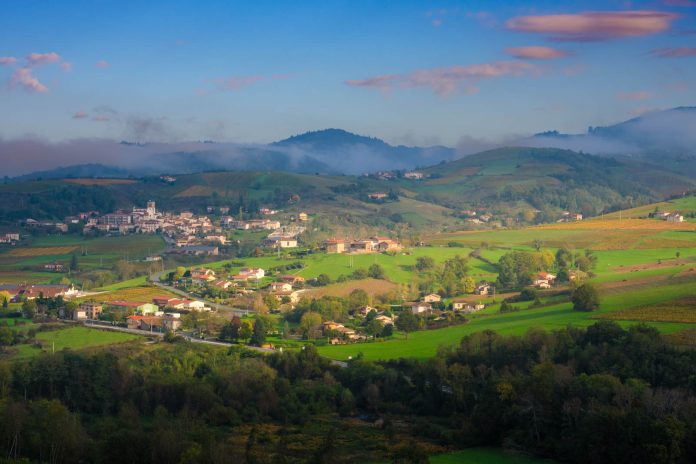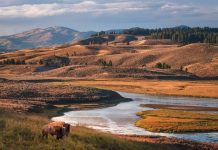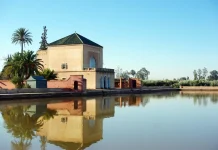Some trips are about ticking off bucket-list destinations, while others are about immersing within the soul of a spot. For us, Beaujolais was the latter. Known for its rolling vineyards, medieval villages, and famed wine culture, this enchanting region in France is a world away from the bustling streets of nearby Lyon. With this two-day Beaujolais itinerary, you’ll enjoy golden-stone hamlets, indulgent wine tastings, and gourmet meals. This journey wasn’t nearly seeing a spot—it was about feeling it.
Two Days in Beaujolais

Our trip began from our Hôtel Le Royal Lyon – MGallery in Lyon, where our tour guide picked us up after breakfast, and we hit the road early. The drive into the Beaujolais region took slightly below an hour as we watched the cityscape give solution to gentle hills and plush vineyards. The air was cooler, the sky was clearer, and the atmosphere more relaxed, and we knew we were in for a treat. Wine lovers and scenery seekers, Beaujolais was our type of place!
Day 1: From Lyon to Southern Beaujolais

Morning Day 1
Our first stop on our Lyon Itinerary was Ternand, a medieval village perched high on a hill. Time looked as if it would stand still here. As we wandered the narrow cobblestone streets, the honey-colored stones unique to the world added to the nice and cozy and timeless glow. We wandered the streets dating back to the thirteenth century as we took within the views of the encompassing vineyards. This was the right introduction to Beaujolais.
Oingt – Most Beautiful Village in France

The charm of Ternand was only the start. A brief drive later, we arrived in Oingt, a town so picturesque it has been named considered one of France’s most beautiful villages. There are only 150 villages with this distinct designation, and Oingt boasts this title because of its beautiful setting, artists’ community, and unique qualities.
Unlike Ternand’s quiet solitude, Oingt buzzed with creativity. Its winding streets were lined with art studios, boutiques, bakeries, and cafes, each offering a glimpse into the colourful community that calls this village home.

We climbed to the highest of the lookout tower for unparalleled views of the valley of the Azergues River. We walked the village’s fortified partitions and explored its medieval church. The village’s artist community adds to its beauty, and we had the chance to fulfill renowned Calligraphy artist Yves Dimier.

After he showed us his technique of creating his masterpieces, we tried our hand on the craft. It was amazing to see how much work goes into his art. Even though we didn’t leave as calligraphy masters, we were gifted with a signature of our names in his own calligraphy handwriting.
Lunch

Lunch was spent at La Table du Donjon in Oingt, where the meal matched the great thing about the setting. The restaurant sits on a terrace with views of the Beaujolais mountains. Lunch consisted of a decadent mushroom tart paired with a crisp Beaujolais Blanc.
Afternoon
From medieval villages of the morning, it’s now time to sample the local Beaujolais wines. The afternoon is all about tasting and discovering positive Beaujolais.
Celia and David Large Vignerons

The afternoon promised a better have a look at the lifetime of a winemaker, and we met Celia and David Large. They offer immersive experiences, and we watched firsthand the seasonal work that goes into taking good care of the estate’s plots. We tried our hand at pruning the vines and tilling the soil. There is numerous work to be done, and it was a treat to have a glimpse behind the scenes.
But the reward is the ultimate product, and we enjoyed a tasting of their cuvées right in the midst of the vineyard, overlooking the valley.
Château de Champ-Renard

The afternoon ends at Château de Champ-Renard, an estate that looked as if it would embody the romantic ideal of a French château. The highlight, nevertheless, was the wine and cheese workshop. The château’s sommelier guided us through a tasting of 4 wines, each paired with a neighborhood cheese. The combos were magical, with the flavors dancing on our palates in perfect harmony. I don’t think we now have ever enjoyed a wine pairing that was so thorough. The cheeses matched each wine perfectly.
Dinner

That evening, we made our solution to La Robe Rouge, a gastronomic gem tucked into the center of the vineyards. We had eagerly anticipated the meal, crafted by Chef Thomas Guignier, whose inventive tackle regional flavors has earned the restaurant glowing praise. Opting for the dégustation menu, we prepared ourselves for a culinary journey of discovery.
The entrée, a dish of fennel paired with smoked haddock, kiwi, and a purée of capers, was beautifully plated. They easily accommodated Dave’s gluten allergy by serving parsnips with escargot and a cardamom mouse. Does that sound heavenly? Each dish was paired with fastidiously chosen Beaujolais wines, which elevated the meal to latest heights.
The final course was a dessert that epitomized indulgence: a tiramisu made with two varieties of chocolate and accented with black truffle.
Overnight

As night fell, we arrived at Villa Alexandre, our accommodation for the 2 nights we were within the region. This 4-star boutique hotel, nestled within the vineyards of Régnié-Durette, was once a family home. Its charm was undeniable, from the elegant furnishings to the serene garden seamlessly mixing into the encompassing countryside. Our room was a sanctuary, with windows overlooking the courtyard.
Day 2: Exploring Northern Beaujolais

The morning sunlight streaming into our room at Villa Alexandre was the right wake-up call. After a fast breakfast featuring freshly baked croissants and homemade jam (they even served gluten-free bread for me), we set out for day two of our Beaujolais itinerary.
Morning Day 2
Château de Pizay

Château de Pizay is a sprawling estate in the center of Beaujolais that’s as much a feast for the five senses as a hub of wine excellence. One of the region’s oldest and largest wineries, Château de Pizay, has been cultivating its vineyards for the reason that eleventh century.

While the promise of wine tasting beckoned, we began our visit with a singular experience that Château de Pizay is renowned for, the Sensory Trail. This interactive journey is designed to have interaction all five senses and is an modern solution to deepen your appreciation for the art and science of winemaking.
The Sensory Trail is situated within the cellars, where a series of stations invite you to find the essence of wine through touch, sound, sight, smell, and taste. The experience was immersive from the beginning. At the primary station, we ran our fingers over textured surfaces designed to mimic the texture of soil, bark, and grape skins. It was then on to testing our sense of smell. The olfactory station lined up scents representing key aromas present in Beaujolais wines.

We went through the stations testing our knowledge, and at the tip, they scored our tests to see how our noses held up. I’m glad to announce that we passed and are on our solution to becoming amateur Sommeliers.
The trail culminated in one of the simplest ways possible—with a tasting. We sampled several of Château de Pizay’s finest wines. We could sample as much or as little as we liked as they’d spouts lined up inside their boutique. After our tasting, we walked through the grounds to enjoy its gardens that were designed by the identical person requisitioned to design the gardens of Versailles.
Château de la Chaize

Off to the following winery! Dating back to 1676, Château de la Chaize is a masterpiece of French design. Its symmetry and elegance are the work of Jules-Hardouin Mansart, the architect behind parts of Versailles, while André Le Nôtre landscaped its expansive gardens.

After one other informative wine tasting (I even bought a bottle of their Broulliy), it was time to maneuver on, because the day was just starting. Yes, it wasn’t even noon yet, and we had already been tasting wine for hours. That’s the best way it goes in Beaujolais!

From Château de la Chaize, we continued to Mont Brouilly for a fast stop to see the breathtaking views in Beaujolais. The 360-degree panorama was mesmerizing—fields and vineyards stretched to the horizon, their patterns broken only by the occasional farmhouse or church spire.
Lunch

Lunch was a highlight of the day. Midway through our second day in Beaujolais, we arrived at Le Coq in Juliénas, a restaurant that has been serving up tradition for greater than a century. The first course was escargots de Bourgogne, a classic dish with elevated parsley butter and served with a crisp green salad.

The foremost course couldn’t resist the coq au vin. The tender chicken, braised in red wine, was accompanied by shiitake mushrooms, sweet onions, and a buttery, whipped purée that melted on the tongue. The meal ended with a cheese plate featuring selections from the local Ferme du Bois Denis. All of this was paired with delicious Beaujolais wines.
Afternoon
When we finally stepped outside, the sun was high, casting a golden glow over the village’s vineyards. Full and deeply satisfied, we were able to walk across the corner to Château de Juliénas.
Château de Juliénas

We were initially imagined to do a wine tour in a vintage 1964 Volkswagen Combi, however the season was over, so we must save that for the following visit. Instead, we tasted more wine of their cellars and toured their caves. I’ll admit, we were feeling quite glad by this time!
Terrasse de Chiroubles

After a full day of wine and food, a walk was so as, and the hilltop vantage point of Terrasse de Chirouble was a superb solution to find our second wind. The trail resulting in the 740 meters above sea level viewpoint was peaceful, allowing for an ideal view of the ten Beaujolais Crus before me.
Dinner Villa Alexandre

Tonight, we had a probability to calm down at Villa Alexandre. Some people opted for time within the sauna and pool, while others enjoyed a cocktail within the lounge. We had a nap on the welcoming bed.
The restaurant is a sublime setting with French classics. I opted for the cheese board as I can never have enough fromage in France. It was the right ending to an ideal two days in Beaujolais.
A Farewell to Beaujolais

As we packed our bags the next day, able to return to Lyon, we couldn’t help but feel a deep sense of gratitude. Beaujolais had offered us greater than only a getaway; it had given us an experience wealthy in flavor, history, and wonder. From the golden-stone villages to the rolling vineyards and the unforgettable meals, every moment was a reminder of life’s easy pleasures.
For those in search of a journey that nourishes each the body and soul, Beaujolais is waiting to welcome you.
When to Go to Beaujolais:

Be it spring or fall, Beaujolais is a quiet region. If you’d prefer to see the vineyards awake and wearing their lush green robes, spring is an excellent time to go to. The weather is mild, and it’s an ideal time to explore slowly without the summer crowds. If you like warmer weather and spending lunchtime on charming restaurant terraces, summer is selection.
The Beaujolais hills are at their most beautiful in the autumn when the vines are heavy with grapes and the hills are ablaze with golden color. November’s Beaujolais Nouveau celebrations are a fun and festive time to go to. It’s considered one of France’s hottest wine holidays and an excellent time to experience the region’s joie de vivre.
What to Pack for Beaujolais
Beaujolais is a relaxed region, however it’s also elegant and refined. You’ll need comfortable walking shoes to hike the cobblestone streets of Oingt and Ternand and to walk the vineyards. Lightweight, loose fabrics are perfect for summer days, but don’t forget to bring layers for cooler evenings. If you’re booking restaurants like Auberge du Cep or Ema Restaurant, you may dress up in casual chic attire. And bring space in your luggage for wine. You’ll want it. Seriously, you’ll want numerous it.
Getting Around Beaujolais

Beaujolais is simple to navigate by automotive. The winding country roads are an enormous a part of the region’s charm, and also you’ll encounter a lot of its hidden gems with luck. A GPS is useful, but don’t write off map apps or ask the locals for directions. Public transportation is minimal, but guided tours are an excellent option in case you’d reasonably not drive. Also, with a guided tour, you may drink all of the Beaujolais wines you want!
Many châteaux and vineyards offer wine tastings and tours, and a few even pick up and drop off. Logistical details are taken care of so you may deal with the wine.

The final detail is to learn some French. While many within the tourism industry speak English, the locals don’t. A friendly “bonjour” and “merci” go a good distance on this welcoming region. They’re keen about their history, land, and wine, and a straightforward “ça va” can result in a phenomenal friendship. We use Babbel and have found it helpful.
With some planning, patience, and practice, Beaujolais is the right region to decelerate and savor. It’s not a destination big on flash or fancy but wealthy in experience and wine. As I learned, it’s okay if it’s not all concerning the wine. Sometimes it’s higher.
Escape the ordinary and discover the extraordinary! From bustling cities to serene landscapes, every journey begins with a single step—let us guide yours. Enjoy curated itineraries, hidden gems, and hassle-free bookings designed for explorers at heart. Whether it's a weekend getaway or a globe-trotting adventure, your Next unforgettable experience is just a click away.










